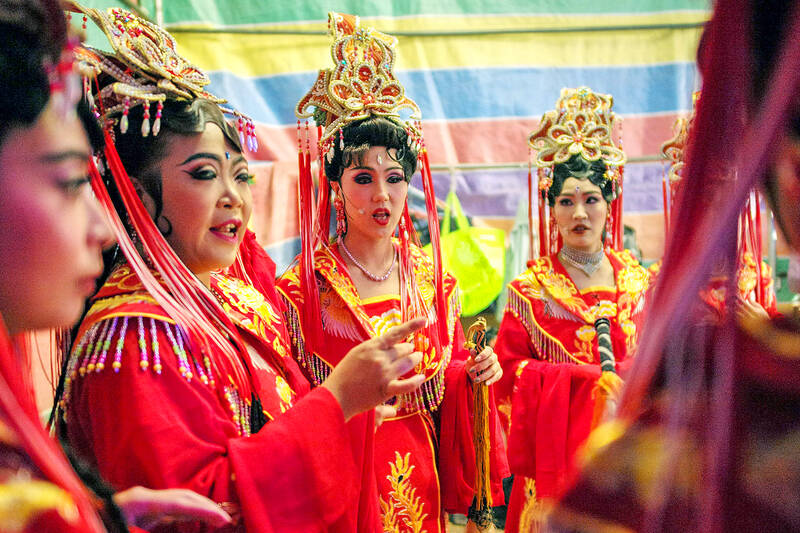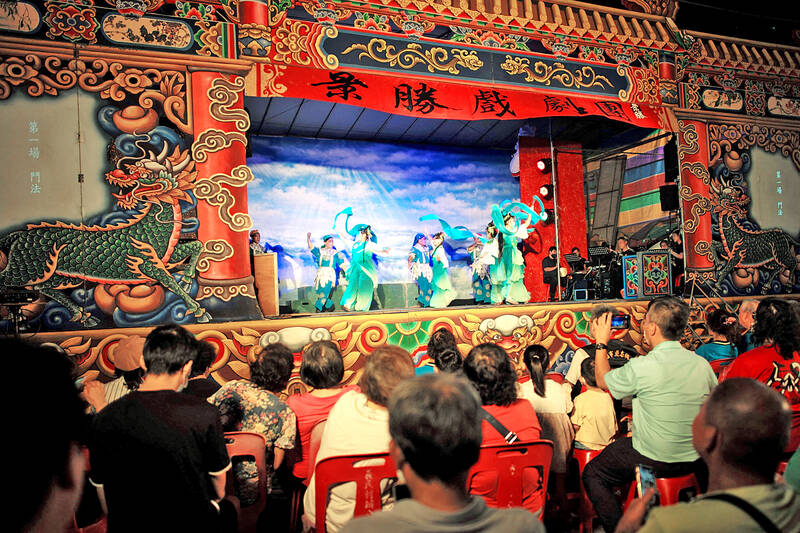Dressed in a robe fringed with beaded tassels, traditional Taiwanese opera singer Jen Chieh-li (任潔儷) applies the final touches to her heavily painted face as she prepares to take the stage. The 34-year-old is a member of Jing Sheng Opera (景勝戲劇團), one of a handful of troupes in Taiwan still staging traditional dramas in the Hakka language.
Taiwan’s traditional Hakka opera, usually performed at religious festivals, dates back to the late Qing Dynasty and was brought to the nation by Hakka settlers from southern China.
Even as its popularity dwindles, Jen, who has trained at a drama school since the age of 12, said she would not give up the fading art.

Photo: Sam Yeh, AFP
“I could find a regular job, but it would be a waste of all the time and effort I have devoted to studying and performing Hakka opera,” she said.
That sweltering night in Taoyuan, Jen was performing Legend of the White Snake, a Chinese folk tale about a romance between a man and a serpent spirit. About 100 people — mostly of an older generation — sat on plastic stools to watch the show on a makeshift stage outside a temple in a reflection of Hakka opera’s struggle to capture the attention of a shrinking audience.
“It is a niche performance art as many people don’t even understand the language,” said Chiang Yu-ling (江玉玲), who founded the Jing Sheng Opera troupe with her husband, Lin Bao-mu (林保木), 19 years ago.

Photo: Sam Yeh, AFP
There are only eight Hakka troupes in Taiwan that are able to keep regular staff, albeit with financial support from the government and private sponsors, Chiang said.
She is counting on new blood, such as Jen, who is studying for a master’s degree in performance art, to help bring in more and younger audiences.
“My husband and I are in our 50s and we have limited ideas. We hope to get more young people on board ... to make Hakka opera more different,” Chiang said.
Hakka shares similarities with Peking opera, the most dominant form of traditional Chinese opera that has UNESCO heritage recognition, but language is one of the main reasons for Hakka opera’s flagging popularity. In Taiwan, Hakka make up less than 20 percent of the population, and even those within the community are no longer fluent in the language.
“My father’s generation speak mostly Mandarin already and I speak very little Hakka,” said Louis Lo, 30, who was accompanying his elderly relatives to the show. “The opera doesn’t appeal to young people due to the language barrier.”
To attract more fans, Jing Sheng’s troupe has incorporated modern elements into traditional performances.
One example is their update of a Chinese folk drama involving a dragon princess and her human lover, which now includes street dance sequences, pyrotechnical acts and acrobatics.
“We are getting the audiences to know Hakka opera through more innovative performances and hopefully they would also want to watch the traditional ones,” Jen said.
Despite their dwindling audience numbers, fellow performer Shih Yu-tsen (施侑岑), 31, said the art form “definitely won’t vanish.”
“There may be fewer Hakka operas, but people are nostalgic,” she said. “They will recall the past all of a sudden and they will want to watch it.”
Besides, a show ticket costs as little as NT$200 with student discounts, Jen said.
“We often say it just takes the same amount of money to buy [a cup of] Starbucks [coffee] to support traditional art, to keep it alive,” she said.

Taipei has once again made it to the top 100 in Oxford Economics’ Global Cities Index 2025 report, moving up five places from last year to 60. The annual index, which was published last month, evaluated 1,000 of the most populated metropolises based on five indices — economics, human capital, quality of life, environment and governance. New York maintained its top spot this year, placing first in the economics index thanks to the strength of its vibrant financial industry and economic stability. Taipei ranked 263rd in economics, 44th in human capital, 15th in quality of life, 284th for environment and 75th in governance,

Greenpeace yesterday said that it is to appeal a decision last month by the Taipei High Administrative Court to dismiss its 2021 lawsuit against the Ministry of Economic Affairs over “loose” regulations governing major corporate electricity consumers. The climate-related lawsuit — the first of its kind in Taiwan — sought to require the government to enforce higher green energy thresholds on major corporations to reduce emissions in light of climate change and an uptick in extreme weather. The suit, filed by Greenpeace East Asia, the Environmental Jurists Association and four individual plaintiffs, was dismissed on May 8 following four years of litigation. The

A former officer in China’s People’s Liberation Army (PLA) who witnessed the aftermath of the 1989 Tiananmen Square massacre has warned that Taiwan could face a similar fate if China attempts to unify the country by force. Li Xiaoming (李曉明), who was deployed to Beijing as a junior officer during the crackdown, said Taiwanese people should study the massacre carefully, because it offers a glimpse of what Beijing is willing to do to suppress dissent. “What happened in Tiananmen Square could happen in Taiwan too,” Li told CNA in a May 22 interview, ahead of the massacre’s 36th anniversary. “If Taiwanese students or

The New Taipei City Government would assist relatives of those killed or injured in last month’s car-ramming incident in Sansia District (三峽) to secure compensation, Mayor Hou You-yi (侯友宜) said yesterday, two days after the driver died in a hospital. “The city government will do its best to help the relatives of the car crash incident seek compensation,” Hou said. The mayor also said that the city’s Legal Affairs, Education and Social Welfare departments have established a joint mechanism to “provide coordinated assistance” to victims and their families. Three people were killed and 12 injured when a car plowed into schoolchildren and their